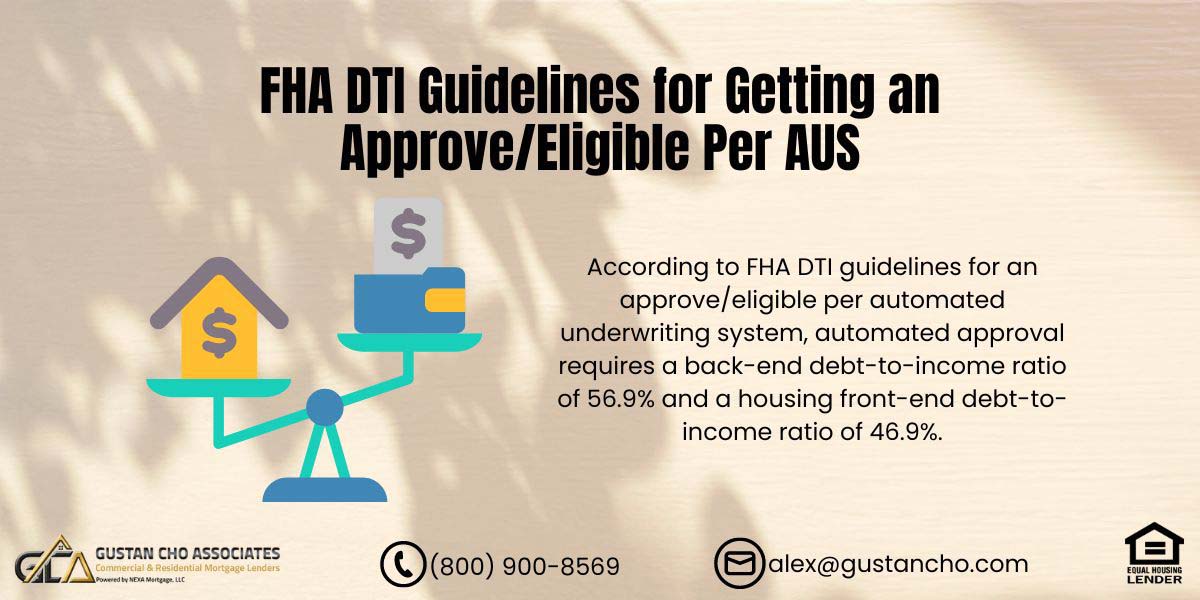First-time homebuyers, especially, may be easily overwhelmed by the complexities of purchasing a home. One of the most critical aspects of obtaining a mortgage is grasping the Debt-to-Income (DTI) ratio, for which FHA loans are particularly crucial. For approval or eligibility per AUS (Automated Underwriting System), these FHA DTI Guidelines are important. In this guide, we will explore these guidelines in depth, answer some FAQs, and help you navigate through an FHA loan with ease.
Understanding FHA Loans
What Are FHA Loans?
These are mortgages provided by the Federal Housing Administration to enable low-to-moderate-income borrowers to get a mortgage. These loans have more relaxed requirements for down payments and credit scores compared to normal ones, thus making them appropriate for more potential homeowners. The insurance backing of the government lessens the risk of default for lenders which results in better terms on their part.
Ready to Qualify for an FHA Loan? Let’s Ensure Your DTI Works for You!
Reach out now to discuss how we can help you meet these guidelines and get approved for a loan.
Why Choose an FHA Loan?
FHA loans are best suited for first-time home buyers with poor credit ratings and those without savings or reserves towards a down payment. The key benefits include:
Lower Down Payment: Most conventional loans require at least 20% down payment, while the FHA loan requirement is only 3.5%.
Flexible Credit Requirements: It is possible to secure an FHA mortgage plan, provided one can raise 3.5% towards a deposit, with a minimum score of 580.
Higher DTI Ratios: We will provide details about the higher DTI ratios under discussion, which make it easier for individuals who have other obligations to qualify.
Loan Assumption: The buyer has the option to assume your mortgage under the existing terms when you sell your house, which can make your property more appealing to potential buyers.
FHA DTI Guidelines
It is important to understand the FHA DTI guidelines for refinancing so that you can be considered approve/eligible per AUS. Here are some of these guidelines broken down.
Front-End DTI Ratio
The housing ratio also called the front-end DTI ratio, only includes housing costs. These include mortgage principal, interest, real estate tax payments, homeowner’s insurance premiums, and, if applicable, homeowners association fees. If you want to be approve/eligible per AUS in line with FHA DTI Guidelines, your front-end DTI should not exceed 31% of your gross monthly income.
Affordability
Homebuyers often wonder if they can afford the monthly mortgage payment. The front-end DTI ratio prevents borrowers from spending too much money on homes. Knowing about all costs associated with a house can help alleviate worries about affordability.
Back-End DTI Ratio
This ratio considers all monthly debt obligations, including housing costs, credit card debts, car loans, student loans, and other recurring debts. Your back-end ratio must not exceed 43% of your gross income per month, as outlined by the FHA DTI Guidelines, to obtain an approve/eligible status through the automated underwriting system (AUS).
Managing Multiple Debts
Trying to balance multiple debts while staying within the parameters of FHA’s permissible DTI may prove difficult for most people. To improve your DTI and boost your loan application, evaluate present debt commitments and strategies for reducing or consolidating them.
Gustan Cho Associates offers mortgage loan options and loan programs without income verification. The back-end debt-to-income ratio is calculated by dividing the estimated new housing payment plus monthly minimum payments that reflect on a credit report by gross monthly income. Debt-to-income ratios are calculated on gross income before taxes. The income that is used is only qualified income.
Overlays on FHA Loans and Debt-to-Income Ratio
Although HUD DTI guidelines state that borrowers can have 46.9% or 56.9% DTI, most lenders have lower debt-to-income ratio requirements than FHA DTI guidelines. Most lenders require debt-to-income ratios not to exceed 45% DTI, while some FHA lenders will go up to 50% DTI. This is not the FHA’s requirement. It is the lender’s requirement, which is called FHA lender overlays.
Borrowers are told they do not qualify for an FHA loan due to higher debt-to-income ratios due to lender overlays.
According to FHA DTI guidelines for an approve/eligible per automated underwriting system, automated approval requires a back-end debt-to-income ratio of 56.9% and a housing front-end debt-to-income ratio of 46.9%. Please get in touch with us at Gustan Cho Associates at 800-900-8569, text us for a faster response, or email us at gcho@gustancho.com. Gustan Cho Associates has no lender overlays on government and conventional loans.
FHA Loan DTI Guidelines Got You Confused? Let’s Help You Understand!
Contact us today to see how we can help you meet FHA DTI guidelines and secure the financing you need.
Compensating Factors
Borrowers with higher ratios may qualify for an FHA loan when there are compensating factors that mitigate risk; this means that a larger percentage of high-risk borrowers could still qualify for this type of financing. Such compensating factors include larger down payment amounts, sizeable investments, a history of handling higher affordable house rates, and extra sources of income. These factors are acknowledged by FHA DTI Guidelines and hence more chances of getting through.
Higher DTI Ratios
Although high DTI ratios can be scary, knowing that compensating factors make approval possible is comforting. In case you have a high DTI ratio, consider enhancing your loan application with the use of some compensating factors to boost your chances of getting an approve/eligible per AUS.
Impact of Credit Score
The FHA DTI guidelines are important, but your credit score also has a significant influence during the review process. A better credit score can offset a higher DTI ratio and result in an approve/eligible per AUS. In addition to the fact that the minimum FICO score for FHA loans is 580 with a 3.5% down payment, will receive better terms and conditions if you have higher credit score.
Credit Problems
Many people question how their credit scores might impede their loan approvals. To address this, go through your credit report for mistakes, pay off some existing debts, and avoid opening new credits before applying for an FHA loan. These steps are useful in boosting your FICO score and conforming to FHA DTI Guidelines.
Applying Through Automated Underwriting System (AUS)
Lenders employ Automated Underwriting Systems (AUS) to establish borrowers’ risks and decide whether they qualify to secure a mortgage or not. The system balances out FHA DTI Guidelines against other factors such as credit history, employment, and assets, among others. An approve/eligible per AUS means that one meets the lender’s requirements while refer/eligible outcome may require manual underwriting.
Understanding AUS Results
Getting an approve/eligible finding can be perplexing and frustrating at best. In cases like these, consult with your lender to know why it turned out this way so that you may get help on what to do next. Manual underwriting provides a road to approval, especially when strong compensating factors are proven by the borrower.
Preparing for the Mortgage Application Process
To navigate FHA DTI Guidelines successfully, prepare and obtain an approve/eligible per AUS. Here are a few steps that can help you:
- Analyse Your Financial Position: Check your earnings, expenditures, and liabilities. Use this data to determine your DTI ratios in relation to FHA DTI Guidelines.
- Develop better credit score: Pay off debts, avoid late payments and correct any inaccuracies on your credit report. Better credit rating can make a big difference.
- Save for a down payment: Even if FHA loans have low down payment requirements, increased savings act as a compensating factor that improves application chances.
- Get together all supporting documentation: Be ready to provide verification of income, employment, assets, and liabilities. Having all these documents will facilitate the process.
- Speak with a mortgage professional: A mortgage expert like Gustan Cho Associates can guide you through FHA DTI Guidelines and boost the possibility of obtaining an approve/eligible per AUS.
Common Mistakes to Avoid
Avoiding common mistakes can help you adhere to FHA DTI Guidelines and secure loan approval:
- Not considering small debts: Small monthly payments could also add up and affect your debt-to-income ratio calculation therefore consider all debts involved.
- Changing Jobs: Stable employment history is an important aspect. Subsequently it is advisable not to change jobs or go self-employed while processing mortgage applications.
- Large Purchases: Refrain from taking long-term loans to acquire a new vehicle or furniture since they increase your liability, which means that your debt-to-income ratio will also be affected by such moves.
- Inaccurate Information: Make sure every detail on the application form is accurate. Discrepancies may lead to delay or rejection of the proposal, hence the necessity for accuracy in filling out loan applications.
- Not Shopping Around: Different lenders may have different criteria. Compare various lenders who will work with your financial situation.
Self-Employed Borrowers: What Should You Know?
Self-employed borrowers need help applying for FHA loans easily. These tips will help you get better prepared.
- Documentation: Please ensure that you have tax returns for a minimum of two years, as well as profit and loss statements and any other pertinent financial records.
- Consistency: Your income should be smooth. Lenders want consistent earnings over time.
- Business Expenses: Know how business expenses and deductions affect your reported income and DTI ratio.
- Seeking Professional Advice: Get advice from a financial advisor or an accountant who can effectively present your financial information.
Ready to Apply for an FHA Loan? Let’s Make Sure Your DTI Meets FHA Guidelines!
Reach out now to learn more about FHA DTI guidelines and get pre-approved for your home loan today!
What is the Qualified Income for a Mortgage?
Examples of qualified income are as follows: Full-time income. Part-time, overtime, bonuses, and other income can only be used if borrowers have two years of seasoning. There is a likelihood that it will continue for the next three years. Child support and alimony income can be used if they continue for the next three years. Rental income can be used if it is declared on the borrower’s tax returns.
Royalty income can be used if it continues for the next three years. Social Security income can be used and grossed up by 15%. Pension income can be used. Income from a second full-time job can be used if seasoned for two years
Bank statement loans and stated income loan programs are back. Borrowers who are self-employed and show little to no income can qualify for NON-QM Loans without a waiting period after bankruptcy or foreclosure, and no income verification is required. For more information, please get in touch with us at 800-900-8569, text us for a faster response, or email mortgage inquiries to gcho@gustancho.com.
The Impact of Financial Changes That Have Taken Place Recently
Such changes can affect your DTI ratio as well as your loan application. Be aware of the following:
- Debt Payoff: Though paying off large debts may improve your DTI ratio, make sure you still have enough savings and maintain financial stability.
- Income Increases: An income increase could positively raise one’s DTI ratio. Note any unexpected salary increments or other sources of revenue.
- Unexpected Expenses: Be ready for unexpected expenses that may alter your finances. Keep some money aside for emergencies.
What to Do After Approval
After receiving approve/eligible per AUS (Automated Underwriting System,) keep these things in mind till closing:
- Maintain Financial Stability: Avoid taking out new debt or making any big changes to your finances before the closing date.
- Prompt Response: Address requests from lenders quickly so there are no delays.
- Final Walkthrough: Ensure the property is agreed upon by completing a final walkthrough.
Conclusion
Navigating the FHA DTI Guidelines is crucial, as they will enable you to get an approve/eligible per AUS status and achieve your home-ownership dream. Understanding the DTI ratios, compensating factors, credit score, and AUS process can help you prepare a strong application. For any queries or guidance regarding your FHA loan application, leave a comment or reach out so we may help you more promptly. We are always here for you.
Knowledge about the FHA DTI guidelines makes the process easier and more bearable, whether you are a first-time home buyer or refinancing your home. With the right information and readiness, you can confidently proceed toward homeownership. Remember that preparedness, following the guidelines, and employing professional assistance when necessary are some of the ways in which success can be achieved. Best of luck on your journey to becoming a homeowner!
FAQs: FHA DTI Guidelines for Getting an Approve/Eligible Per AUS
- 1. What are the FHA DTI Guidelines? FHA DTI Guidelines relate to stipulations on debt-to-income (DTI) ratios that the Federal Housing Administration(FHA) requires for loan applicants. Lenders use these guidelines to determine if a borrower can afford the loan.
- 2. What is a Debt-to-Income (DTI) Ratio? It calculates the proportion of your monthly earnings that are used to repay debts compared to the total monthly income. Lenders use this figure in qualifying body whereby; higher front-end and back-end DTI ratios are allowed in FHA loans.
- 3. What is the Front-End DTI Ratio for FHA Loans? The Front-End DTI ratio, or housing ratio, includes only mortgage principal, interest rate, property taxes, homeowner’s insurance, and homeowner’s association fees when calculating it. The front end should not be more than 31% of your gross monthly income, as per FHA DTI Guidelines.
- 4. What is the Back-End DTI Ratio for FHA Loans? The back-end ratio encompasses all recurring monthly financial obligations, including housing expenses, credit card bills, car payments, student loans, and other debts. According to FHA DTI Guidelines, you cannot have a back-end ratio of more than 43% on your gross monthly pay.
- 5. Why Are FHA Loans Beneficial for First-Time Homebuyers? First-time home buyers may benefit from these mortgage products because they offer low down payments (as low as 3.5%), flexible requirements concerning credit score, and allow for higher allowable debt-to-income ratios.
- 6. Can I Qualify for an FHA Loan with a High DTI Ratio? Compensating factors like higher down payment, large savings, history of adequately managing bigger house payments, or increased earnings must be considered before applying, as per FHA DTI guidelines. Such things would mitigate risks associated with such high fha dti ratios thereby increasing chances of loan approval.
- 7. How Does My Credit Score Affect My FHA Loan Approval? Ultimately, the FICO score is one of the most important factors in determining whether an FHA loan application will be approved or not. It is important to follow the FHA DIT guidelines because a higher credit score can compensate for a higher DTI ratio and increase the likelihood of receiving an approve/eligible status from the AUS. The minimum FICO score for FHA loans is generally 580, with a 3.5% down payment.
- 8. What is an Automated Underwriting System (AUS)? AUS is used to evaluate borrower risk levels and determine eligibility for mortgages. It looks at guidelines like the FHA DTI Guidelines as well as other factors, such as job history, credit history, and assets.
- 9. What Should I Do If I Receive a Refer/Eligible Result from AUS? When this happens, it implies that your mortgage application may require manual underwriting. Discuss with your lender about why this result occurred and explore possible solutions to fix them. Generally, strong compensating factors can help get a person approved through manual underwriting.
- 10. How Can I Prepare for the FHA Loan Application Process? Before starting to apply for the said mortgage type, always consider what exists within you financially and also start by building your credit score, of course. First, save money for a down payment, gather the required documents, and then consult with a mortgage expert in order to have a full understanding of FHA DTI Guidelines so that you can stand a better chance of being approved.
- 11. What Are Common Mistakes to Avoid When Applying for an FHA Loan? When applying for an FHA loan, it’s necessary to avoid common errors. Miss no small debts that could impact your DTI ratio, change jobs, or make large credit purchases. Provide accurate information and look around for different lenders to increase your chances of being approved.
- 12. What Are the Special Considerations for Self-Employed Borrowers? Self-employed borrowers should be prepared to give detailed documentation such as at least two years of tax returns, profit and loss statements, along with other financial records. Consistent income is key and knowing how business expenses and deductions affect your reported income and DTI ratio is vital.
- 13. How Do Recent Financial Changes Impact My DTI Ratio? Recent financial changes involve paying off debt, increases in income or any unexpected expenses can impact a borrower’s DTI ratio as well as his/her loan application. Maintaining financial stability, documenting any changes, and having an emergency fund are all crucial.
- 14. What Should I Do After Receiving an Approve/Eligible Per AUS? After receiving approval from the Automated Underwriting System (AUS), it’s important not to take on new debt before closing or make significant financial changes that could put your finances at risk. You must promptly reply to any requests from your lender in order not to delay the process. Also, you must do a final walk-through of this property so as to ensure it remains in the agreed-upon condition.
Understanding FHA DTI Guidelines will help secure an approve/eligible per AUS & result in homeownership. If you have any questions about or need assistance with your FHA loan application please comment below, contact us at 800-900-8569, or email us at alex@gustancho.com. The team at Gustan Cho Associates is available 7 days a week, on evenings, weekends, and holidays
Whether you are a first time homebuyer or looking to refinance; knowledge and preparation are key ingredients for a smooth successful home buying process.
This blog about FHA DTI Guidelines for Getting an Approve/Eligible Per AUS was updated on July 5th, 2024.
Wondering How Your DTI Affects Your FHA Loan Eligibility? Let’s Break It Down for You!
Contact us today to learn how your DTI affects your approval and find out how we can help you secure the right loan.










